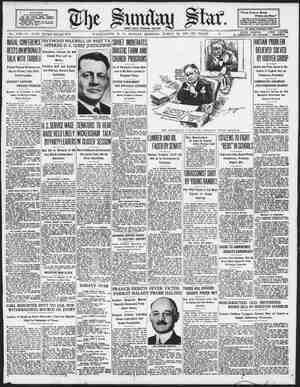Evening Star Newspaper, March 16, 1930, Page 100
You have reached the hourly page view limit. Unlock higher limit to our entire archive!
Subscribers enjoy higher page view limit, downloads, and exclusive features.
ASIE BUNDAY STAR, WASHINGTON, D. C, MARCH 16, i930. THE HONORABLE FOOLS F you describe Mehmet Yah the city- bred, you describe Ali Hassan the country-bred. The first was captain of horse in the army of his majesty the Grand Khan of High Tartary, while the other was chief of the Abdali tribe, whose houses stippled a valley tucked into the yellow, brittle swash of the steppe far east of Samar- kand. They were tall men both, a bit hard in look, a bit braggart, with storm-gray eyes never narrowed at the sight of danger, and to stubborn, self-hurting pride. Twin brothers they might have been.. But—and this hap- pened before they were striving for the- love of a woman, striving with tense passion that stops for neither sleep nor supper nor mercy—they hated each other. As sweet as honey was this hate, as bitter as gall. Yet until the end their blades remained in their scabbards like doves in a cote. For there was fear. Not fear of each other. But fear of what would happen, so swift and cruel, to what was most dear to them—in the chief's case to his tribe, and where the captain was concerned, to his younger brother in Samarkand. Fear well grounded, since neither could forget a day a few years earlier, when the Grand Khan of High Tartary, lolling against the cantle of his saddle, had been surveying his troopers’ handi- work—broken swords and daggers, splintered lances, bodies of man and horse and camel stark and lifeless and already the vultures dipping bow. HE Grand Khan saw, pitied, shuddered a little, then shrugged his shoulders. He ab- horred strife. But he-—thought—what was he to do? He was ruler of this land. Its weal was his duty. And these Abdali—arrogant, law- less, thumbing their noses at decent authority, ambushing caravans, raiding to the very gates of Samarkand . . . why, he told himself, peace was a white thing, but must at times be mulched in blood to make it grow more sturdily. He turned to Ali Hassan, erect before him, the price of peace?” he asked in a purring voice. “Peace only because you are the stronger,” LRRIE #5'3 “We are enemies.” “No longer. There is peace.” “Peace of the hand, not peace of the heart. You are the conqueror, I the conquered.” “What is it to be between you and me?” the chief. “There is safety only in silence.” “Aye! Silence—and hatred—between you and me—always!” And they bowed to each other with stilted, false urbanity and went their ways, Ali Hassan valley, where his copper-faced Mongol troopers were making camp. S0 the years passed. Years of unabated hate and silence. Years, by the same token, of peace while the land prospered under the captain’s stewardship. A traveler seeing the smoke wreaths from cozy hearths linger on the air might have said: “Here, by Allah, is happiness!” But it brought no happiness to Mehmet Yar, All it meant to him was crushing loneliness. 0 j f% All Was Fair in g War, but Not “By my honor,” cried the chief, “but I am sorry that I must take & pretty lad’s life because of @ mere woman.” By Achmed Abdullah. with her airs and graces wilderness?” cried Khalsaran been tolerant and kindly, and the priest's wife. come to the valley to see about taxes, she saw both men’s hands reach for their sword i 1t Egfi i ;Eiéiié 2 i i £ - captive she is, by the law of the steppe. The law—ah—" he smiled thinly, “which you, the
